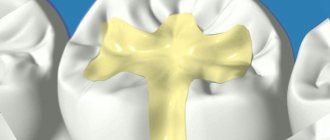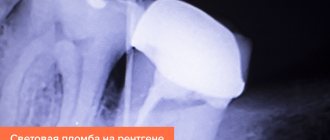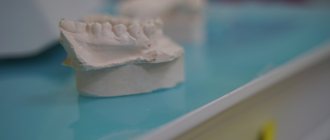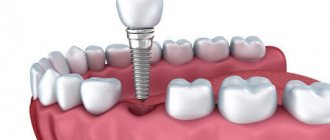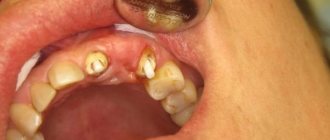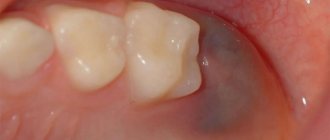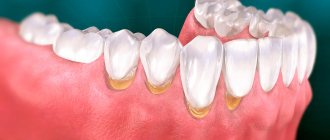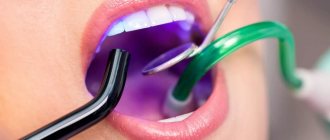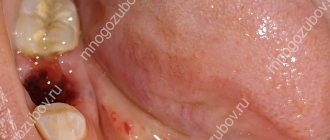How to avoid complications after implantation
- How to behave after surgery
- Postoperative nutrition
- How long does it take to heal?
- How are sutures removed?
- Postoperative complications
- Swelling after dental implantation
- Inflammation and temperature
- Numbness
- Antibiotics after implantation
- Simultaneous (immediate) implantation
During implantation, the dentist places an artificial tooth root into the gum, which then becomes the basis for a removable or fixed denture. The operation is always complex and multi-stage, and to achieve success it requires the joint work of the doctor and the patient. Even at the current level of development of medicine, it is impossible to completely guarantee the absence of complications: aching pain, hematomas, swelling, bleeding, infection, fever. It is also possible for the implant to fail.
But if you follow the recommendations, it will be easier to avoid complications, and the implant will take root faster.
So, what to do after dental implantation to quickly relieve the consequences of surgery and the best healing of the gums?
When is bleeding dangerous?
The risk of massive bleeding during bone grafting is extremely low, since during the preoperative diagnosis the doctor excludes conditions against which this dangerous complication may develop. Therefore, you should not worry about bleeding during a sinus lift or other surgery. Thanks to several decades of experience, modern technologies and drugs, bone grafting is a quick and safe procedure that does not pose a threat to the patient’s life.
However, bleeding may occur later, at home, several days or even weeks after surgery. There are two main pathological conditions in which bleeding may occur after sinus lifting and bone grafting - vessel damage, hypertensive reaction, peri-implantitis and implant rejection.
How to behave after surgery
Doctors give the following recommendations after dental implantation:
- Do not use irrigators. Any treatment of the oral cavity should be as soft and gentle as possible. Oral baths are indicated. Active rinsing with antiseptic solutions is prohibited before the sutures are removed.
- Brush your teeth with gentle movements using a soft brush (your doctor will recommend a brush). You can use dental floss and superfloss. But it is better to clean your teeth directly at the operation site only with a cotton swab dipped in a 3% hydrogen peroxide solution.
- Avoid involuntary sneezing, coughing and blowing your nose, especially if the implantation is associated with sinus lift surgery. A sharp increase in pressure in the maxillary sinus can lead to mechanical damage to the bone tissue and displacement of the implant.
- Avoid extreme temperature changes. For this reason, it is better not to visit baths and saunas.
- Air travel can also be harmful because rapid changes in altitude make it difficult to avoid a surge in pressure in the ear-nose-throat system.
Lifestyle
Our life consists of more than just diet and exercise. There are a lot of things planned for every day. Not everyone has the opportunity to go on vacation or take sick leave. What you definitely shouldn’t do is go to work immediately after installing the implant. Give your body time to recover, take a time out, at least for a few hours.
- Avoid extreme temperatures. Cancel the bathhouse, sauna or ice-hole jumping. It’s also better to postpone the pool for a month.
- You should not fly on an airplane during the first week. If a sinus lift was performed, it is better to postpone the flight for a month.
- During your recovery from upper dental implants, you need to be careful when coughing and sneezing. Try not to puff out your cheeks, open your mouth only slightly. Blowing your nose is not recommended at all, but if necessary, do it without effort or strain.
- This is a good time to quit smoking. You absolutely cannot smoke on the first day, and then you simply cannot. If you can’t bear it, after each cigarette you need to rinse your mouth with an antibacterial agent like Miramistin. Smoking slows down recovery after implant placement. The percentage of successful engraftment in smokers is also lower than in non-smokers.
Postoperative nutrition
Avoid hot foods until the anesthesia wears off. If you eat or drink something too hot, you can accidentally burn your gums because they won't feel the temperature.
In the first two days, do not drink coffee: it increases blood pressure and this can lead to bleeding. This also explains the requirement to exclude alcohol and smoking.
Within 10 days after surgery, to strengthen injured bone tissue, include calcium-containing foods in your diet: cottage cheese, kefir, yogurt.
Do not eat salty, spicy, very hot or frozen foods, as well as rough foods - crackers, nuts. The load on the teeth should be reduced as much as possible, so you should avoid foods that require careful active chewing - for example, tough meat.
The best option for a postoperative diet is pureed, semi-liquid, moderately warm food (soups, cereals, smoothies), or finely chopped.
How long does it take to heal?
Bone tissue and gums heal after dental implantation on average from three to six months, and the period is different for the upper and lower jaws. The lower jaw will heal in three to four months, but the upper jaw will take longer: four to six months. This is due to the greater bone density of the lower jaw.
Sometimes the healing rate deviates from the average time frame, because it depends on the individual characteristics of the patient’s body: the speed of regeneration, the strength of the immune system, the pain threshold. Even such factors as gender, age, lifestyle, diet and daily routine of the patient are important.
In any case, recovery after surgery takes some time. Following medical recommendations will help protect yourself from complications during healing.
How are sutures removed?
Sutures after dental implantation are usually removed 10-14 days after surgery, unless otherwise indicated. Throughout this period, surgical sutures need careful, delicate handling. After suturing, there may be some discharge or slight pain. It is permissible to use painkillers (Nise, Ketanov or another remedy recommended by a doctor).
Modern dentistry uses strong synthetic threads that do not break even with active chewing of food, so dental sutures now rarely come apart. But suture dehiscence is still possible - however, it is most often associated with violations of medical recommendations, most often with mechanical damage to the operation area.
Removal of sutures does not require anesthesia and is completely painless.
Postoperative complications
The most common complications after dental implantation are:
- Pain syndrome. The norm is mild soreness of the gums in the area of implantation for 1-2 days. In cases where severe pain does not go away even after taking the generally recommended painkiller, you should consult a doctor, because this is most often a symptom of a complication.
- Inflammation.
- Seams coming apart.
- Hemorrhages. After surgery, ichor often separates from the gums, the amount of which quickly decreases and disappears. It is enough to remove it with cotton swabs. But if the bleeding becomes more intense, you should consult a doctor immediately.
There are also complications such as inflammation of the sinuses, peri-implantitis (inflammation of the tissue around the implant, leading to destruction of the supporting bone tissue), mucosal hyperplasia (pathological growth of the mucous membrane in the area of the implant), damage to the implant and prosthesis.
Why is there blood flowing?
If it continues to flow a week after implantation, then this is bad in any case, but the reasons (and ways to eliminate them) may be different. Here's why it's even possible:
- the seams come apart due to the fact that the thread is damaged by a toothbrush;
- the patient has too low blood clotting, which can be caused either by illness or by taking certain medications that tend to reduce blood clotting;
- during implantation, a blood vessel was damaged - accompanying signs of this are particularly heavy bleeding and the occurrence of a hematoma;
- the patient has a history of cardiovascular diseases;
- due to hypertension or fear of surgery, the patient’s blood pressure has increased, which is why the blood cannot clot normally due to the strong pressure.
It also happens that particles of cement simply get into the thickness of the gums, which irritate the soft tissues and cause them to bleed. Excess cement must be removed; for this purpose, repeat radiography is even prescribed after the operation.
Swelling after dental implantation
In the first three days after implantation, swelling may occur in the gum tissue. This is the body's natural reaction to surgery. Most often, a tumor is an indicator that blood is actively flowing to the operation site.
But if you want to avoid the discomfort caused by swelling, you can reduce the risk of its occurrence. To do this, in the first two days, apply cold to the operation site: for 5-10 minutes with breaks of 20 minutes. Do not apply ice directly to the skin; it is best to wrap it in a towel. In rare cases, the tumor will require the use of antihistamines, antibiotics (to prevent infection) or treatment with antiseptic solutions.
It will also help to avoid swelling by eliminating sudden stress loads on the body: physical overload, hypothermia, overheating.
How can traditional medicine help?
Many patients believe that traditional medicine is absolutely harmless, since it contains only natural ingredients. However, this opinion is erroneous - often natural substances provoke an allergic reaction, and if the preparation method is violated or overdose, they cause poisoning.
Also, the use of some infusions is incompatible with the use of pharmacological agents.
To relieve pain and inflammation and speed up healing of the wound surface during the recovery period, the following are used:
- Infusion of chamomile . 1 tsp. crushed herbs, pour 250 ml of boiling water, close, wrap in a towel and let it brew for half an hour. Similarly, you can prepare a mixture of equal parts of chamomile and calendula flowers. Strain the infusion and gently rinse your mouth 3-4 times a day. The product will prevent inflammation, relieve pain, swelling, redness, and accelerate wound healing.
- A decoction of eucalyptus and echinacea leaves reduces bleeding and prevents the formation of hematoma. Mix crushed herbs in equal proportions, select 1 tbsp. l. mixture, place in a fireproof container, pour 250 ml of boiling water. Place on very low heat for a quarter of an hour. Cool, strain, rinse your mouth with the broth 3-4 times a day.
- Aloe pulp will help relieve swelling. Wrap the crushed leaf of the plant in gauze and apply to the wound surface for 10-15 minutes. Repeat the procedure every 3-4 hours until the swelling disappears.
Some home healers recommend applying a fresh, washed plantain leaf to the wound. But to avoid infection, doctors advise replacing the fresh leaf with a decoction at room temperature.
Inflammation and temperature after dental implantation
Your body may also react to surgery with a low-grade fever, that is, an increase in general body temperature to 37°C. Even if the temperature stays within these limits for several days, this will remain the norm. You should be wary only when there is a persistent increase in temperature to 37.8-38°C. In this case, it almost certainly means inflammation, which requires immediate intervention (for example, in case of peri-implantitis, this should be sanitation of abscesses, bone regeneration, as well as professional oral hygiene).
In this case, you should not delay visiting a doctor: the inflammation can not only worsen on its own, but also lead to implant rejection.
Frequently asked questions and answers
Don't worry: it's completely normal to feel some discomfort. But be sure to pay attention to the signals your body sends. If in doubt, contact support to find out if your symptoms are normal. Be attentive to your teeth and your body as a whole - remember that implants, the entire jaw system, and you yourself need some time for rehabilitation.
Postoperative consequences and complications
This section discusses the most popular questions about conditions that arise during or in the first days after the installation of implants. Please note that it is very important to distinguish between the concepts of “consequences” (this is the norm, since tissue injury occurs during surgery) and “complications” (they are a pathological condition that requires immediate consultation with a doctor).
During the operation, I heard the doctors and felt that they were doing something in my mouth, although without pain, but I should have been sleeping, why?
You need to understand the difference between concepts such as “sedation” and “general anesthesia.”
General anesthesia is a complete shutdown of consciousness and the patient's immersion in sleep. As a rule, it is carried out by inhalation. Breathing is provided by an artificial lung ventilation device (ALV). Therefore, when using general anesthesia, the patient does not hear or feel anything. Sedation can be xenon (superficial, essentially to calm and saturate the body’s cells with oxygen), as well as intravenous. In the second case, certain anesthetics are introduced into the body (selected individually), their dosage is calculated based on the patient’s weight, his state of health, and the duration of the procedure. If necessary, the drug can be reintroduced during surgery. At the same time, local anesthesia is used.
The Smile-at-Once Clinic has an agreement with a specialized and licensed service of professional anesthesiologists. The ambulance and the team of doctors are certified within the framework of the standards and are an ambulance substation. Therefore, treatment under general anesthesia and intravenous sedation is carried out under the strict supervision of specialized specialists.
The difference between sedation and general anesthesia is that the patient retains the ability to breathe on his own, there are no involuntary reflexes of the respiratory tract (coughing, swallowing), unlike anesthesia, the patient is conscious and can, if necessary, follow the doctor’s instructions.
Since sedation uses more gentle drugs (unlike general anesthesia), the patient does not fall asleep, but relaxes. The action is individual: someone falls asleep for several hours, someone plunges into a state of complete relaxation. If you belong to the second type, then you will really feel everything that happens in the oral cavity. But all procedures are painless, since high-quality local anesthesia is used. And the sensations remain at the level of “moving instruments” in the oral cavity.
I just returned home from implantation and my cheek started to swell. Is this normal and what can I do?
This is a normal process caused by tissue trauma during implant installation. The swelling reaches its peak on the 3rd day, after which it should gradually subside. If the situation is opposite, be sure to consult a doctor. To reduce swelling, you need to apply a cold compress for the first two hours, repeating the course throughout the day if necessary.
The wound bleeds even several hours after the operation. This is fine?
If the bleeding is minor, there is nothing to worry about. You can stop it by applying a piece of sterile gauze to the wound and closing your jaws tightly. Remember not to rinse your mouth, actively move your jaw, chew, suck or swallow forcefully - all of this can increase bleeding.
If 3-5 hours after surgery the bleeding not only does not decrease, but also intensifies, you need to consult a doctor.
Yesterday I had an operation, and today I woke up with blood on my pillow, and the bleeding appears periodically throughout the day, what should I do?
Occasional bleeding is normal up to 7 days after surgery, but usually goes away within 2-3 days. We strongly recommend sleeping in a horizontal position right away, with pillows on the sides of your head. If necessary, make a comfortable tilt angle of up to 30 degrees for yourself.
It is important to sleep strictly on your back, but if you accidentally turned your face to the side in your sleep and were in this position for a long time, then due to tissue compression, bleeding is possible, and depending on the load, even profuse bleeding. The main thing is that it stops within 1-2 hours after you take a vertical position. If the bleeding is persistent, be sure to contact Patient Services to arrange an unscheduled examination by your physician.
I feel uncomfortable in the lying position, I feel pressure in the jaw area and pulsation in my head. What to do?
Such sensations arise due to increased blood flow to the head. In this situation, try sleeping in a semi-sitting position (tilt up to 30 degrees) - use an additional pillow or place it under the mattress, increasing the inclination of the bed. This way the head will be at a higher level in relation to the body and the unpleasant sensations will subside. But it is advisable to fix your head so as not to throw it to the side.
I had bruises on my face – hematomas. Is this normal and how can I remove them?
Hematomas are a consequence of vascular injury during implant installation. They appear quite often after the installation of two-piece structures, as well as after zygomatic implants - they appear approximately 2-3 days after the operation. You have absolutely nothing to worry about - the color of the bruises will change as the tissue begins to recover. In the fight against swelling and bruises, various gels for resolving bruises, for example Badyaga Forte, will help you.
My lips are dry and have small cracks - what does this mean?
This is also a completely normal condition caused by a long stay in the dentist's chair and the lack of natural wetting of the mucous membranes. For the first two to three days, use petroleum jelly or a cream containing lanolin to relieve dry lips. A regular balm may not be enough - you need a cream that is as rich and moisturizing as possible. Also make sure you drink enough fluids.
I have increased salivation after having implants - is this normal?
Saliva is a very important biological medium for the organs and tissues of the oral cavity. It contains many enzymes that promote normal digestion and the formation of healthy oral microflora. The therapeutic norm is the production of liquid by saliva in the amount of 2 ml per ten minutes. In the case of implantation, especially during the period when the denture has not yet been installed, the patient may complain of hyperactivation of the secretory function of the salivary glands already when 5 ml is produced. This is a normal reaction to tissue injury as a result of implantation, especially if the operation was performed to restore a full row of teeth.
But increased salivation is also possible as a result of damage to the lingual nerve. Its symptoms are pain when swallowing, changes or complete loss of taste, numbness of the tongue and its biting, burning, drooling. If the integrity of the nerve is not compromised, but there is compression on the nerve or its sheath is damaged, then the unpleasant sensations are restored within a period of 7 days to 4 months. Otherwise, more time may be required for rehabilitation, and in case of extensive disruption of the integrity of the nerve bundle, microsurgical interventions may be required.
Failures in the functioning of the endocrine system are another common cause of hypersalivation. Usually, problems with the thyroid gland are to blame. The symptom can also be triggered by diabetes mellitus or hormonal changes - during menopause or puberty.
Part of my face is numb, it’s difficult to talk and open my mouth, does this mean that the nerve is damaged and how long will these sensations last?
Numbness is caused by compression of the trigeminal nerve, its stretching, or injury - complete or partial intersection. In the case of sprain or compression without compromising the integrity of the trigeminal nerve, the sensations pass quite quickly - within up to 7 days as blood circulation in the bone tissue improves. But if there was partial damage to the fibers of the nerve bundle, then the rehabilitation process can take from 14 days to 6 months. In cases of severe trauma, implants may need to be reinstalled because the body of the implant interferes with the restoration of axons (processes) in the nerve bundles.
According to research, damage to the trigeminal nerve during dental implantation occurs in no more than 3% of patients, while only 1.7% are diagnosed with permanent neuropathy, requiring microsurgical correction of the situation.
In our clinic, before the operation, careful computer planning of the placement of implants is carried out, after which surgical templates are printed, protecting the patient and the doctor from incorrect installation of implants. Immediately or the next day after the operation, a control computed tomography is performed, on which a control commission (consilium of doctors), in accordance with international quality assessment protocols, compares the placement of implants with the original plan and makes a conclusion about the success of the operation, or makes recommendations to the attending physician on the need to take additional measures
Please note that there is no point in hiding the fact of damage to the trigeminal nerve for the doctor and the clinic; it will reveal itself anyway - this is the first thing. Secondly, even if this happened, the consequences are eliminated by properly selected therapy and joint work between the doctor and the patient.
Yes, if damage occurs, then the patient will have to undergo quite a long period of rehabilitation (up to 6 months), but in difficult clinical situations of complete absence of teeth and low quality bone tissue, the doctor works in very limited conditions, so, unfortunately, some consequences but not life-threatening and health dysfunction cannot always be avoided.
Do not confuse nerve damage with compression on it that occurs in the bone as a result of swelling after the installation of implants located close to the nerve endings. Compression goes away along with swelling and numbness in this situation is a normal reaction.
Most often, such symptoms typically appear 2-3 days after multiple implantations; they are a normal reaction to tissue injury when screwing in implants and damage to intraosseous capillaries. Improvements will be noticeable almost immediately after installing the prosthesis on the implants and activating the chewing load, and with it the restoration and blood circulation in the bones.
How long does it take for wounds to heal after implantation and for implants to take root?
The first phase is the healing of soft tissues. It takes about a week. Already after this stage you will feel much better. If the installation of implants was carried out in a minimally invasive way - using a protocol, then rehabilitation takes only 2-3 days. The second phase is osseointegration, that is, the direct engraftment of the implant into the bone tissue. It takes from 3 months to six months, in difficult situations up to 8-12 months - during this time the bone actively grows around the implants, strengthening their position.
Is it necessary to take antibiotics after implantation?
Antibacterial drugs are prescribed during major surgery in order to reduce the risk of developing inflammatory processes. In addition, they are mandatory for those patients in whom implantation was carried out against the background of periodontitis or inflammatory processes in periodontal tissues (cysts, granulomas, etc.) were diagnosed before the installation of implants. In other cases, you can limit yourself to vitamins, local anti-inflammatory drugs and antihistamines.
How normal is discharge from a postoperative wound?
If you had bone material or an RPF membrane grafted, if the doctor used healing drugs (for example, Alvostat), you should not panic - discharge from the wound in such situations is normal. But we still recommend that you contact support and discuss the nature of the discharge with your doctor.
Can stitches come apart after implants are installed?
This is a fairly rare phenomenon, the main reasons for which are excessive stress on the operated area, frequent touching of the wound with the tongue, and failure to comply with hygiene rules. As a rule, we use resorbable threads (dissolve on their own) - such sutures do not need to be removed. But in any case, after installing the implants, you will still visit the implantologist in the coming days - the attending physician will monitor your condition.
My temperature is elevated, it’s shocking. Do I need to see a doctor?
An increase in body temperature up to 39° in the first 3 days is a completely normal reaction of the body to external influences and the entry of a foreign body (in this case, an implant). It should not cause concern - in this way our body accelerates all tissue repair processes. But if the temperature subsided, you felt well, and then there was a sharp increase to 38-39°, you should immediately consult a doctor.
To drink or not to drink antipyretics - you must decide for yourself, based on your own well-being. Monitor your condition as each person handles fever differently.
Questions related to prosthetics
When implantation is carried out according to immediate loading protocols, the prostheses are installed immediately - within 3-4 days maximum. At first, you will experience some discomfort - and this is completely normal, because before treatment you lived for a long time without teeth, your bite has changed. Now it just takes time for both you and your jaw system to get used to the changes.
I'm not very comfortable chewing and talking with my new denture. Is this normal and how can I fix the situation?
Yes, it is normal. You haven’t had teeth for a long time, so the muscles have atrophied, the temporomandibular joint is used to functioning differently, so it takes time to adapt - you will get used to it. Due to the lack of teeth, the position of your tongue has also changed - it has adapted to the situation, so after installing the prosthesis, you experience difficulty pronouncing some sounds.
I have problems with diction after prosthetics, I have a lisp and cannot pronounce sounds, how can I fix this?
To restore your diction, pronounce tongue twisters and speak as much as possible. Place a few Sula lollipops (sugar-free) in your mouth and read aloud for 15-20 minutes, up to 3 times a day. In 1.5-2 weeks of regular training, you will completely restore your diction.
| The snout pig was white-nosed, blunt-nosed; I dug up half the yard with my snout, dug, dug. |
| Karl stole Klara's advertising, and Klara stole Karl's budget. |
| In Kabardino-Balkaria, valocordin from Bulgaria. |
| The fast talker quickly said quickly, That you can’t quickly talk all the tongue twisters, but you can’t over-speak all the tongue twisters, But, having quickly spoken, he quickly said, That you can’t talk all the tongue twisters, but you can’t over-speak. |
In addition, after the installation of implants, an adaptation period begins; the prosthesis itself is created specifically for it, so the design has characteristic disadvantages compared to a permanent future prosthesis. In particular, you may feel like your food is being crushed rather than chewed when chewing – this is also normal. In order to avoid excessive load on the implants and distribute it evenly, during the adaptation period, the orthopedist specially erases some of the tubercles on the chewing surface of the teeth. During re-prosthetics, the contact surfaces will be restored.
How long will I have to eat liquid food? When is it safe to start eating solids?
In the first days after implantation, food should really be as soft, liquid and puree as possible (baby food, soups, yoghurts). After installing the dentures, the same thing happens. But already 2-3 days after prosthetics, you need to start changing the consistency: replace the mashed potatoes with boiled potatoes and eat them in pieces, cottage cheese can be grained, meat is no longer baby food, but well-chopped cutlets. Firstly, it is important to independently monitor your feelings. Secondly, relatively solid foods should be introduced into the diet only after you begin to perform oral hygiene - it is necessary to remove food debris. Thirdly, in the first days you will regularly visit the doctor - he will monitor the quality of fixation of the prosthesis and the degree of stabilization of the implants, the healing of all tissues of the oral cavity, so he will be the one who will tell you when you can start eating solid food - based on your specific situation .
Read even more questions and answers about dental implantation in our separate collection of Frequently Asked Questions.
Numbness after dental implantation
For most patients, anesthesia wears off within four to five hours after implant placement. Then oral sensitivity should return. If numbness persists after this period, then you have cause for concern because it may indicate nerve damage. This is only possible when the operation was performed on the lower jaw, because there are no large nerves in the upper jaw.
Other symptoms of mandibular nerve injury are lack of facial skin sensitivity, excessive salivation, and difficulty speaking and eating. Timely diagnosis will help to establish the nature and extent of the damage and manage the treatment with medications rather than surgical methods.
Is it possible to do MRI and CT with a dental implant?
Contrary to popular reviews on the Internet, magnetic resonance imaging (or MRI) with dental implants is allowed. Just be sure to warn the radiologist or laboratory technician that you have implants (and what they are made of - titanium, tantalum or Roxolid alloy) even before the examination. Typically, metals and metal alloys used for dental implants are not magnetized, but may create interference or “artifacts” in the image. Therefore, the laboratory technician changes the tomograph settings to eliminate distortions. The procedure itself is safe, the implant will not be pulled out of the bone by a magnet - it will not move at all.
Antibiotics after dental implantation
For preventative purposes, the doctor prescribes a course of antibiotics after surgery. In most cases, this is inevitable, since surgical trauma, even with the modern level of development of medicine, carries a high risk of infection. Therefore, it is better not to ignore antibacterial drugs prescribed by a doctor if you do not want to additionally place unnecessary burden on your immune system to fight infection.
Most often, the course of antibacterial therapy does not exceed 7 days, and broad-spectrum drugs are prescribed - amoxicillin, amoxiclav, cephalosporins. They are characterized by low toxicity and have long proven themselves to be well tolerated by the human body.
Simultaneous (immediate) implantation
This prosthetic method is a one-stage implantation. In this case, the dentist removes the patient’s damaged tooth and immediately installs an artificial root.
Implantation immediately after tooth extraction is only possible if the bone tissue has sufficient volume to accommodate the implant - for example, if the tooth was damaged or lost in an accident. But tooth loss much more often occurs due to diseases when bone tissue is lost. Therefore, this method is not always available.
Dental implantation is an achievement of modern dentistry that allows you to restore lost teeth and use them for the rest of your life. And if you carefully follow your doctor’s recommendations, your smile will always bring joy to your loved ones!
